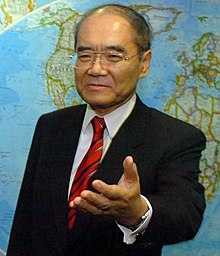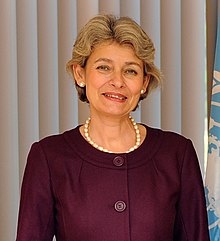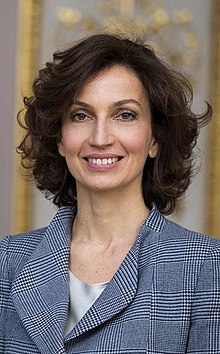UNESCO
| UNESCO | ||
|---|---|---|
| ||
| Datuak | ||
| Izen laburra | UNESCO eta ONUÉSC | |
| Mota | Nazio Batuen agentzia espezializatua, nazioarteko erakundea, gobernu arteko erakundea eta erakundea | |
| Jarduera | ||
| Kidetza | Global Citizen Science Partnership (en) | |
| Kide kopurua | 193 (2019) | |
| Eskumendekoak | ||
| Negozio dibisioak | UNESCO office United States (en) | |
| Agintea | ||
| Lehendakaria | Audrey Azoulay | |
| Egoitza nagusi (1958–) | ||
| Jabea | Nazio Batuen Erakundea | |
| Zeren jabe | ||
| Historia | ||
| Sorrera | 1945eko azaroaren 16a | |
| Ordezkatzen du | International Committee on Intellectual Cooperation (en) | |
| Jasotako sariak | Peabody Awards (1958) | |
| webgune ofiziala | ||
Hezkuntza, Zientzia eta Kulturarako Nazio Batuen Erakundea edo UNESCO[1] (ingelesez: United Nations Educational, Scientific and Cultural Organization) hezkuntza, zientzia eta kulturarako Nazio Batuen erakundea da.
1945eko azaroaren 16an sortu zuten Londresen. Munduko herrialde behartsuetan ikastetxeak egiten laguntzen du, baita liburuak argitaratu eta literatura eta hizkuntza gutxituak sustatu ere. Egungo presidentea Audrey Azoulay frantziarra da.
UNESCOren helburua bakea eta segurtasuna da lortzea hezkuntza, zientzia eta kulturaren bidez. Esan bezala, erakundeak herrien garapena lortu nahi du baliabide natural eta kulturaren bidez. Munduko herriak modernizatu eta aurreratzea haren xedea da, baina kulturaren aniztasuna eta nortasuna galdu gabe. Erakundeak lan handia egiten du herriak alfabetatzen: hartarako, eskolak eraikitzen ditu, baita irakasleak trebatu ere.
UNESCOren helburu nagusiak, laburbilduta, hauek dira:
- Denentzat, kalitateko hezkuntza lortzea eta etengabeko ikasketa.
- Zientzia bultzatzea, garapen iraunkorra lortzeko.
- Gizarte- eta etika- erronka berriei aurre egitea.
- Kultura askotarikoa, bakea eta elkarrizketa sustatzea.
- Komunikazioa eta informazioa erabiltzea, herri-jakintza eraikitzeko.
Lan handiena Afrikan egiten du.
Historia[aldatu | aldatu iturburu kodea]
Sorrera[aldatu | aldatu iturburu kodea]
UNESCOren jatorria 1921eko irailaren 19ra jarraitu daiteke, non Nazioen Ligaren Batzarrak nazioarteko kooperazio intelektuala garatuko zuen komisio baten aukeraketa eskatu zuen. Kooperazio intelektual horren barnean hezkuntza hitza azaltzen ez den arren, alor garratzitsuenetakoa da; garapen kultural eta zientifikoaz gain.[2][3]
Eskakizunaren erantzun moduan, 1922ko urtarrilaren 4an, Kooperazio Intelektualaren Nazioarteko Batzordea (International Committee on Intellectual Cooperation, ICIC) eratu zen.[4] Kontsulta-erakunde hau Nazioen Ligaren komisioa zen, Mendebaldeko Europa inguruan garatua. Erakundearen zuzendarietako batzuk Henri Bergson (1922-1925), H. A. Lorentz (1925-1928) eta Gilbert Murray (1928-1939) izan ziren; beste partaide aipagarri batzuk Albert Einstein, Marie Curie, Robert A. Millikan, eta Gonzague de Reynold izanik. [5][6] Hurrenez, ICICaren erakunde betearazle bezala Kooperazio Intelektualerako Nazioarteko Institutua (International Institute for Intellectual Cooperation, IIIC) eratu zen 1924ko irailean, Parisen.[7] Halaber, II. Mundu Gerrak erakundeen lana eten zuen.[8]
Organizazio pribatu eta garaikideen artean, 1925eko abenduan Nazioarteko Hezkuntza Bulegoa (International Bureau of Education, IBE) sortu zen. Gonernuz Kanpoko Erakunde (GKE) bezala jardun dute nazioarteko hezkuntza ahaleginak bultzatzen beren sorkuntzatik, 1952an komisio bateratua eratu eta 2021. urtean UNESCOren parte bilakatu zirelarik.[2][9]
Erakundearen egitura[aldatu | aldatu iturburu kodea]
Idazkaritza[aldatu | aldatu iturburu kodea]
Idazkaritza UNESCO erakundearen arlo betearazlea da. Zuzenari-Generalak eta honek hautaturiko Staff edo pertsonalak osatzen dute. Pertsonala, Zerbitzu profesional eta Zerbitzu Generalen kategoriatan sailkatzen da; orohar, 700 langileetara heltzen delarik, erakundearen mundu osoko 53 ofizinetan banatuak.[10]
Zuzendari-Generalak[aldatu | aldatu iturburu kodea]
UNESCOko zuzendariak, gaur egun lau urteko termino baten ostean elekzio bidez bozkatzen dira Konferentzia Generalean. Hasiera batean terminoak 6 urtekoak ziren bitartean. UNESCOko zuzendari-generalen zerrenda:
| Izenak | Jatorria | Datak |
|---|---|---|
 |
( |
1946-1948 |
 |
( |
1948-1952 |
 |
( |
1952-1953 |
 |
( |
1953-1958 |
 |
( |
1958-1961 |
 |
( |
1961-1974 |
 |
( |
1974-1987 |
 |
( |
1987-1999 |
 |
( |
1999-2009 |
 |
( |
2009-2017 |
 |
( |
2017- |
Batzorde exekutiboa[13][aldatu | aldatu iturburu kodea]
| Terminoa | I. Taldea
(9 leku) |
II. Taldea
(7 leku) |
III. Taldea
(10 leku) |
IV. Taldea
(12 leku) |
V.a. Taldea
(13 leku) |
V.b. Taldea
(7 leku) |
|---|---|---|---|---|---|---|
| 2012–2015 | [[ [[ |
[[ [[ [[ [[ |
||||
| 2014–2017 | ||||||
| 2017–2019 | ||||||
| 2019–2023 |
UNESCOren estatu parte-hartzaileak[aldatu | aldatu iturburu kodea]
Azken datuen arabera, 2022ko ekainean, UNESCOk 193 estatu parte-hartzaile eta 11 estatu erlazionatu ditu.[14][15]
UNESCOko GKE ofizialak[aldatu | aldatu iturburu kodea]
UNESCO 322 nazioarteko gobernuz kanpoko erakunderekin (GKE) erlazionaturik dago: [16]
- Co-ordinating Committee for International Voluntary Service (CCIVS).
- Education International (EI).[17]
- International Association of Universities (IAU).[18]
- International Baccalaureate (IB).[19]
- International Council for Film, Television and Audiovisual Communication (IFTC).[20]
- International Council for Philosophy and Humanistic Studies (Conseil International de Philosophie et des Sciences Humaines; publishes Diogenes (CIPSH).[21]
- International Council of Museums (ICOM).
- International Council of Organizations of Folklore Festivals and Folk Arts (Conseil International des Organisations de Festivals de Folklore et d'Arts Traditionnels) (CIOFF).
- International Council of Sport Science and Physical Education (ICSSPE).
- International Council on Archives (ICA).
- International Council on Monuments and Sites (ICOMOS).
- International Federation of Journalists (IFJ).
- Liburutegien Elkarte eta Erakundeen Nazioarteko Federazioa (IFLA).
- International Federation of Poetry Associations (IFPA).
- International Music Council (IMC).
- International Police Association (IPA).
- International Science Council (formerly ICSU and ISSC) (ISC).
- International Scientific Council for Island Development (INSULA).
- International Theatre Institute (ITI).
- International Union for Conservation of Nature and Natural Resources (IUCN).
- International Union of Technical Associations and Organizations (IUTAO).
- Union of International Associations (UIA).
- World Association of Newspapers (WAN).
- World Federation of Engineering Organizations (WFEO).
- World Federation of UNESCO Clubs, Centres and Associations (WFUCA).
Izendapen eta Zerrendak[aldatu | aldatu iturburu kodea]
- Gizateriaren Ondare[22]
- Biosferaren Erreserba[23]
- Geoparke Globalak[24]
- Hiri kreatiboak[25]
- Mugikortasun Akademikoen Sarea
- Ondare Kultural Intangiblea[26]
- Galtzear dauden Hizkuntzen Atlasa[27]
Erreferentziak[aldatu | aldatu iturburu kodea]
- ↑ Euskalterm: [Hiztegi Terminologikoa] [2005]
- ↑ a b unesdoc.unesco.org (Noiz kontsultatua: 2022-06-04).
- ↑ Plenary Meetings, Records of the Second Assembly, Geneva: League of Nations, 5 September – 5 October 1921
- ↑ Les réseaux de la coopération intellectuelle. La Société des Nations comme actrice des échanges scientifiques et culturels dans l'entre-deux-guerres https://tel.archives-ouvertes.fr/tel-01853903/document
- ↑ (Frantsesez) Grandjean, Martin. (2018-06-15). Les réseaux de la coopération intellectuelle. La Société des Nations comme actrice des échanges scientifiques et culturels dans l'entre-deux-guerres. Université de Lausanne (Noiz kontsultatua: 2022-06-04).
- ↑ Meylaerts, Reine. (2020). «Cultural Mediators and Their Complex Transfer Practices» Cultural Organizations, Networks and Mediators in Contemporary Ibero-America (Routledge) doi:. ISBN 978-0-429-29940-7. (Noiz kontsultatua: 2022-06-04).
- ↑ «Wayback Machine» web.archive.org 2021-08-19 (Noiz kontsultatua: 2022-06-04).
- ↑ Hamen, Susan E.. (2014). The Great Depression and World War II : 1929-1945. ISBN 978-1-62403-178-6. PMC 870724668. (Noiz kontsultatua: 2022-06-04).
- ↑ unesdoc.unesco.org (Noiz kontsultatua: 2022-06-04).
- ↑ (Ingelesez) https://plus.google.com/+UNESCO. (2012-09-25). «Governance» UNESCO (Noiz kontsultatua: 2022-06-03).
- ↑ a b c d e f g h i j (Ingelesez) https://plus.google.com/+UNESCO. (2017-11-14). «UNESCO's former Directors-General» UNESCO (Noiz kontsultatua: 2022-06-03).
- ↑ (Ingelesez) «Director-General, Audrey Azoulay | UNESCO» www.unesco.org (Noiz kontsultatua: 2022-06-03).
- ↑ (Ingelesez) «Chairperson | UNESCO» www.unesco.org (Noiz kontsultatua: 2022-06-03).
- ↑ (Ingelesez) https://plus.google.com/+UNESCO. (2012-09-06). «Member States» UNESCO (Noiz kontsultatua: 2022-06-03).
- ↑ (Ingelesez) https://plus.google.com/+UNESCO.+«Countries» UNESCO (Noiz kontsultatua: 2022-06-03).
- ↑ «Organizations maintaining official relations with UNESCO | UNESCO NGO - db» web.archive.org 2012-06-25 (Noiz kontsultatua: 2022-06-03).
- ↑ (Ingelesez) «Education International» Education International (Noiz kontsultatua: 2022-06-03).
- ↑ «IAU - International Association of Universities - The Global Voice of Higher Education» www.iau-aiu.net (Noiz kontsultatua: 2022-06-03).
- ↑ (Ingelesez) «International education» International Baccalaureate® (Noiz kontsultatua: 2022-06-03).
- ↑ (Italieraz) «CICT - ICFT | International Council for Films and Television» Cict (Noiz kontsultatua: 2022-06-03).
- ↑ «The International Council for Philosophy and Human Sciences» www.cipsh.net (Noiz kontsultatua: 2022-06-03).
- ↑ (Ingelesez) Centre, UNESCO World Heritage. «UNESCO World Heritage Centre - World Heritage List» UNESCO World Heritage Centre (Noiz kontsultatua: 2022-06-03).
- ↑ (Ingelesez) https://plus.google.com/+UNESCO. (2019-10-08). «World Network of Biosphere Reserves» UNESCO (Noiz kontsultatua: 2022-06-03).
- ↑ (Ingelesez) https://plus.google.com/+UNESCO. (2019-02-25). «UNESCO Global Geoparks (UGGp)» UNESCO (Noiz kontsultatua: 2022-06-03).
- ↑ «creative cities map | Creative Cities Network» en.unesco.org (Noiz kontsultatua: 2022-06-03).
- ↑ (Ingelesez) «UNESCO - Browse the Lists of Intangible Cultural Heritage and the Register of good safeguarding practices» ich.unesco.org (Noiz kontsultatua: 2022-06-03).
- ↑ «UNESCO Atlas of the World's Languages in danger» www.unesco.org (Noiz kontsultatua: 2022-06-03).

